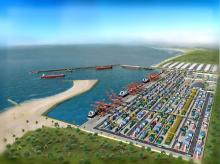The merger between the Nigerian unit of French cement maker
The deal is worth €991.72 million and it will see the combined entity, of which Lafarge group will own 73%, renamed Lafarge Africa Plc and listed on the Nigerian bourse with a market capitalisation of around €2.2 billion.
The merged businesses had 2013 financial year aggregates sales of €991.72 million and EBITDA of €257.84 million (excluding
Some analysts have claimed the merger is a clear signal of Lafarge’s intent to compete for a larger share of Africa’s cement market, a space currently dominated by Nigeria’s
The chairman of Lafarge Wapco, Olusegun Osunkeye has disclosed to shareholders that the Nigerian cement firm would pay the Lafarge group €146.92 million in cash and 1.4 billion in new shares to buy Lafarge’s South African unit and other of its Nigerian businesses in order to combine them. The company also got a shareholder approval to raise 100 billion naira in debt or equity on domestic or international capital markets.
Lafarge owns 60% of Lafarge Wapco, 100% of the Atlas cement company and 58.6% of Ashaka Cement Plc (both Nigerian listed companies). It also jointly owns United Cement Company of Nigeria with Swiss-based
The consolidation of the South African unit with Nigeria’s Lafarge Wapco, Lafarge says, will help accelerate its growth on the African continent and expand its product offering in South Africa and across the region. The companies in the new Lafarge Africa Plc are already set to increase production capacity by an extra 2.5 million tonnes/year in 2016, a further 2.5 million tonnes/year in 2017, and 0.5 million tonnes/year from debottlenecking. This will see total capacity increase to more than 17 million tonnes/year by 2017.
However, Dangote Cement, owned by Africa’s richest man, Aliko Dangote, is set to expand in 13 other African countries, with the introduction of new plants across Africa during H2 2014. Nigeria’s biggest firm with a market capitalisation of around €17.63 billion, Dangote Cement also has the largest cement plant- the Obajana plant in Kogi state, Nigeria – in Sub-Saharan Africa.







